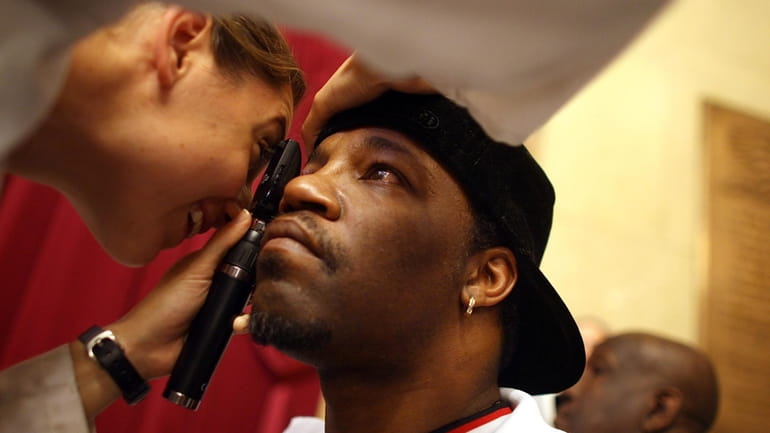Glaucoma and African Americans: Three genetic variants discovered in new study

Melvin Bennett is checked for glaucoma by an opthalmologist at a health fair in the Bronx. Credit: Getty Images/Spencer Platt
A team led by University of Pennsylvania scientists has discovered three genetic variants that offer the first strong clues as to why glaucoma disproportionately affects Black people.
The variants are common in people with African ancestry and are associated with a significantly higher risk of developing the sight-robbing disease, the researchers found in their study of more than 11,000 volunteers.
More research is needed to determine whether these variants — each consisting of just a single “letter” among the 3 billion pairs of letters that spell out the human genome — play a direct role in causing glaucoma.
If the discoveries stand up to scrutiny, the findings could be used to develop better treatments and identify people who could benefit from them, said Shefali Setia Verma, one of the lead study authors and an assistant professor at the University of Pennsylvania’s Perelman School of Medicine.
“The idea is that this can help identify individuals who are at higher risk before any symptoms occur,” she said.
Previous studies have found more than 170 other genetic variants that are involved in glaucoma, a condition in which the optic nerve becomes damaged, often as a result of increased pressure inside the eye. But most of those studies were conducted among white or Asian populations — despite the fact that glaucoma is more common in Black people and, when it occurs, is more likely to lead to blindness.
And most of the genetic variants discovered in those previous studies turned out to play little or no role in the disease for Black people, illustrating the need for diversity in study populations, said physician-scientist Joan M. O’Brien of the University of Pennsylvania.
That’s what prompted O’Brien, Verma and their colleagues to launch the new study, which is among the first — and by far the largest — conducted among Black people.
O’Brien blamed the shortage of studies partly on the justifiable misgivings that many Black people hold about medical research, citing examples such as the Tuskegee experiment, conducted between 1932 and 1972, in which 399 Black men with syphilis (along with 201 men in a control group who did not have the disease) were studied, but not offered treatment.
“Clearly there are reasons for individuals of African ancestry to distrust medicine,” she said. “That doesn’t excuse us from trying to involve people of African ancestry.”
O’Brien hopes that someday the findings could be incorporated into a rapid test, suitable for use in a primary-care office.
Updated 42 minutes ago 2 more body parts suspects in court ... Bethpage park chemical drums ... MTA backs LIRR discount ... Montauk ice problem
Updated 42 minutes ago 2 more body parts suspects in court ... Bethpage park chemical drums ... MTA backs LIRR discount ... Montauk ice problem
